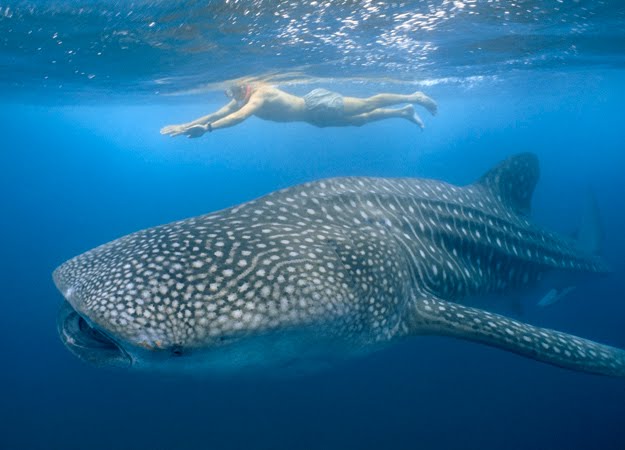INDIA. Verawal, Gujarat. Deep into the ocean – almost 20 km from the shores, I started feeling uneasy as we approached the fisherman’s boat. The boat had accidentally caught a huge bluish mass into its gill nets. A whale shark had been snagged; the huge fish was entangled at the side of a fisherman’s boat.
I had been waiting two days to feel the largest fish in the world and help in her rescue. I shifted into the fishing boat and patted the 8-meter-long fish and felt her responding to my touch. I dove into the deep waters and went under the fish, silently reassuring her.
We cut the net quickly, eager to set her free. With the last bit of net cut, we watched as her deep dive caused a vacuum around the boat. We were ecstatic when she resurfaced as if to thank us.
Trapped off the coast of Verawal in the Saurashtra region of Gujarat, the giant whale shark became affectionately known as “Whali”.
Gentle giant
The whale shark is the largest fish in the world, and one of the most beautiful. Measuring an average of 10 meters, they weigh around 18 tons. Like other fish, they are also considered food in many countries. Their soft flesh, often called “tofu shark”, is a highly-priced delicacy. But the fish is usually hunted more for the oil that she contains in her liver.
Liver oil is used in skincare products, lipstick, Omega-3 health supplements, and for various waterproofing solutions. Also, the cartilage fibers in the fins are sold as display or trophy fins in Asian restaurants.
Protected species
After long lobbying by the Wildlife Trust of India (WTI) and Oscar-winning filmmaker Mike Pandey, the Indian government granted legal protection to whale sharks, listing it as a Schedule I species in the Indian Wild Life (Protection) Act 1972, the highest level of protection granted by the Ministry of Environment and Forests (MoEF).
After consistent lobbying by India and the Philippines, whale sharks were later included under Appendix II of the Convention on International Trade in Endangered Species of Wild Fauna and Flora (CITES).
The internationally-acclaimed Whale Shark Conservation Project was launched in 2004 by WTI with the support of Tata Chemicals Limited (TCL) and the International Fund for Animal Welfare (IFAW) with the aim of stopping illegal killing of whale sharks and creating a groundswell of support for their conservation.

Often whale sharks become “bycatches“, accidentally getting caught in fishing nets when they venture close to shore to give birth. This fact was utilized in a ‘Save The Whale Shark Campaign’. Popular religious leader Morari Bapu equated the fish to the incarnation of a Hindu deity, and accorded it the status of a beloved daughter coming home to give birth to her first child. This helped gain widespread support for the plight of the whale shark.
A Self Documentation Scheme (SDS) was also launched under which the Gujarat Forest Department provides ex-gratia support for fisherfolk, who cut their nets to release accidentally-entangled whale sharks.
Giant beauty
A tropical and temperate equatorial fish species, the whale shark (Rhincodon Typus) is the world’s largest living Chondrichthyan. They are the largest fish on earth; coming in at 13.5 meters and 21 tons.
Read also: Around 500,000 Sharks Likely To Be Killed For The Production Of COVID-19 Vaccine
It’s a beautiful fish to look at, greyish blue-black in color with yellow patches. It feeds on the smallest known creatures, zooplanktons, small fish, algae, cephalopods (like squid), jellyfish, and shrimp. Whale sharks are slow wanderers and leisurely swim at an average speed of about 5 km per hour.
Contrary to their name, whale sharks are not whales. The name contains two parts. Its size, as big as whales, and their feeding habits like that of a whale, using their baleen mouth to filter minute creatures like a sieve, have earned their first name. However, the cartilage that they have instead of bone makes them a true shark. The whale shark is the closest relative of the puny zebra shark.
Tourism boost
Whale sharks, despite their size, do not pose a significant danger to humans. They are docile fish and normally are not bothered by humans swimming along with them.

It should be understood here that the value of the whale shark to local communities is much higher in terms of the revenue generated through tourism as compared to that generated by hunting and killing them. Possibilities are being explored for establishing whale shark tourism in India too. Ecotourism based on snorkeling and viewing whale sharks is becoming quite common and is a significant source of income for the travel industry.


